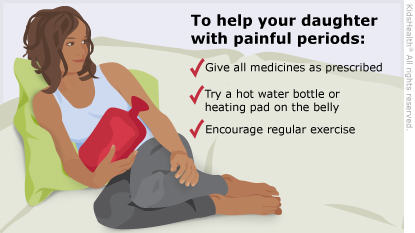Someone with period cramps has pain in the lower belly or back. The pain may start right before a period begins and continue for the first few days of a period. Although period cramps are common, they can be so bad that they can keep kids from going to school, studying, or sleeping.
Health care providers usually treat period cramps with pain relievers taken by mouth. If needed, they might prescribe birth control pills ("the Pill"). The Pill can help balance hormones and make cramps less severe.



Your child has:

What causes period cramps? Period cramps are caused by chemicals in the body called prostaglandins. These chemicals make the muscles of the uterus tighten. This causes pain in the lower belly and sometimes the back. Medicines like ibuprofen and naproxen help decrease how many prostaglandins the body makes.
Are there any other symptoms that come with period cramps? Sometimes, someone with cramps may also feel nauseated, throw up, have diarrhea, have a headache, or feel tired and dizzy.
Will my child need any testing? Usually, no other testing is needed. Your health care provider may order an ultrasound if the symptoms don't get better with medicines.